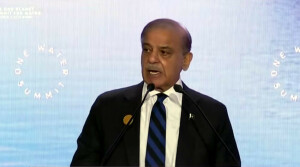 The quest to bring 5G to Pakistan is off to a controversial start. Last month, Zong marketed itself as “the first and only telecom operator to successfully test 5G services” in Pakistan. This promotion didn’t impress other operators and ended up in the sector regulator demanding Zong to “withdraw any advertisements that may mislead the public regarding availability of commercial services based on 5G network”.
The quest to bring 5G to Pakistan is off to a controversial start. Last month, Zong marketed itself as “the first and only telecom operator to successfully test 5G services” in Pakistan. This promotion didn’t impress other operators and ended up in the sector regulator demanding Zong to “withdraw any advertisements that may mislead the public regarding availability of commercial services based on 5G network”.
It is good to see that PTA has the consumers’ back, saving unsuspecting users from a cheerful leap towards deceptive marketing. It’s quite another matter that the telecom authorities were there to celebrate Zong’s “successful” 5G trial amid much fanfare last month. Perhaps if the clever play on words was detected earlier and rectified, it wouldn’t have led to this so-public loss of face for the Chinese operator.
Nothing to take away from Zong, though! In fact, the operator has a history of pushing competitors out of their comfort zone. Zong was the first player to bring 4G to Pakistan when other operators were hesitating even on 3G. Zong is reportedly looking to develop a 5G Innovation Center in Pakistan, with the tech giant Huawei on board.
For the market, it’s a long way to commercial rollout of 5G anyway, as full set of 5G standards are awaited by carriers. Rome wasn’t built in a day. And 5G will take five years to arrive, as per PTA’s reported statements to the Senate. For its part, the PTA has allowed the public testing of 5G, with other operators also in the line to test 5G on different sites.
However, over time, 5G’s commercial availability in Pakistan will confront several stubborn issues.
One is the availability and pricing of spectrum. The telecom authorities will need to vacate or re-farm the frequency spectrums that are most suitable for operation as per emerging 5G standards. Also, with the license renewal process under litigation, an agreement on future spectrum fees will likely be as contentious, if not more, between the finance ministry and the telecom operators.
Secondly, it’s still a long way to go before 5G-compatible handsets are made commercially available even in developed markets. But whenever it happens, it will aggravate the import dependency for Pakistan. The mobile-phone import bill has averaged $650 million in the past five fiscals – but come 5G, pricey, high-end handsets will likely make this figure cross the billion dollar mark.
And thirdly, operators must maintain a healthy score for their sponsors to inject fresh capital here. The PKR slide since December 2017 has severely dented telco’s dollar returns for their HQs. While Jazz is somewhat better off among the pack as it is leveraging its scale after absorbing Warid, the market in general is hit by economic slowdown. And this situation is expected to persist for a few more years.
In the light of the above, the telecom authorities need to come up with a holistic roadmap for 5G in time. The planning process needs to address policy aspects including spectrum management, local handset manufacturing, cost of doing business, digital equality, and consumer protection. Meanwhile, operators should try to be one up on quality-of-service instead of selling illusions.





















Comments
Comments are closed.